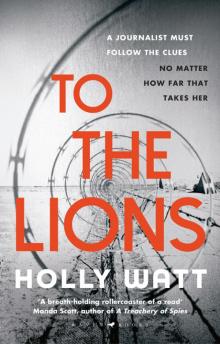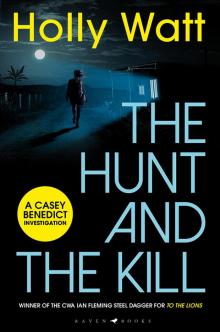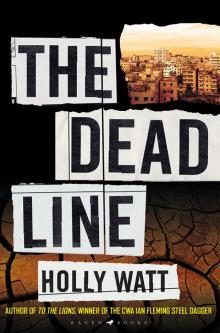- Home
- Holly Watt
To the Lions
To the Lions Read online
To Nicky and Simon
CONTENTS
One
Two
Three
Four
Five
Six
Seven
Eight
Nine
Ten
Eleven
Twelve
Thirteen
Fourteen
Fifteen
Sixteen
Seventeen
Eighteen
Nineteen
Twenty
Twenty-One
Twenty-Two
Twenty-Three
Twenty-Four
Twenty-Five
Twenty-Six
Twenty-Seven
Twenty-Eight
Twenty-Nine
Thirty
Thirty-One
Thirty-Two
Thirty-Three
Thirty-Four
Thirty-Five
Thirty-Six
Thirty-Seven
Thirty-Eight
Thirty-Nine
Forty
Forty-One
Forty-Two
Forty-Three
Forty-Four
Forty-Five
Forty-Six
Forty-Seven
Forty-Eight
Forty-Nine
Fifty
Fifty-One
Fifty-Two
Fifty-Three
Fifty-Four
Fifty-Five
Fifty-Six
Acknowledgements
Note on the Author
She knew where to go.
A restaurant that was quiet, but not too quiet. Loud enough to drown out conversation; quiet enough to catch every word.
She didn’t want his voice to fade, carefully, at just the wrong moment. Expensive gaps between tables helped.
Floors could be traps. She looked for carpets. Floorboards at a stretch. Tiles echoed. Walls could be troublesome, too. Wooden panelling was best, or tapestries.
She eliminated sprawling table decorations, and discarded live music. She usually, but not always, avoided hotels. Rooms upstairs could shift the mood.
She’d learned that expensive was best, because she paid and everyone – everyone – was distracted by a dozen oysters or a Château Lafite.
She’d had lunch here once before. Half enjoying the exquisite food, and half twitching at a raucous coffee machine.
She tipped well, so the waiters would respond immediately, next time.
This time.
And she had made it clear – but oh so politely – that she did not welcome intrusion. Nothing worse than an interruption – Coffee, more wine, the pudding menu? – when all you wanted was that strange sort of peace.
She had eaten in all the best restaurants in London. It surprised her, now, when someone thought it was a treat.
It had to be a place where nobody knew her. Although you could never be sure. It had happened. But she had seen off that danger. ‘Casey? No, sorry . . . My name is Caroline. Caroline Eyre.’ A half laugh. ‘I look like a lot of people.’
And her friends, knowing what she did, would almost-guess and walk away. And her acquaintances would doubt, and amble off, half shaking their heads. ‘I could have sworn . . .’
The light mattered, of course. Always the light.
Every time she walked into a room, now, she was aware of the light. Candles and lamps, windows and daylight. Because glare in her eyes could flare everything.
She dressed for the surroundings too. Always dark colours. Always expensive fabrics. Clothes that covered everything, but made a man want to strip her bare.
She had a generous clothing allowance. They knew it was worth it.
And she couldn’t use her own clothes.
Because the smart suits and the black dresses, the neat shirts and the smart blazers, they would all be ripped apart.
And then, in a crooked attic in Holborn, they would be stitched back together.
But now, the suits and the dresses, the shirts and the coats, now they were different. Now they were – carefully, oh so carefully – embedded with the wires and the buttons, the eyes and the secrets.
And no one would ever see the blank, stark stare of the tiniest hidden camera.
1
The news editor was shouting at his team. Even the people who weren’t in the firing line ambled over, because Ross in a rage was worth watching.
The people who were in the firing line quivered.
‘You’re all fucking useless,’ he bellowed. He was waving a copy of The Times, which had the exclusive interview with the Home Office minister. ‘We’ve been chasing this fucking story for fucking months. There are at least five of you covering this fucking patch and none of you could find a story in a bloody library.’
He hurled The Times to the back of the room, where it confettied the health editor.
‘Fuck’s sake, Ross.’ The health editor jammed the BMA on hold and swung round. ‘Your aim is about as good as your news sense.’
The Times was flung back across the room. The junior minister’s handsome face smiled from the front page. He emanated calm intelligence, and cool ambition.
‘Get the fucking political team on the line.’
The hapless secretary pushed buttons.
‘Yes?’ The political editor’s voice echoed unwillingly down the line. The political team worked from the House of Commons, in a tiny eyrie just beneath Big Ben. The Burma Road, it is called, the corridor where all the papers have an office. In the heart of power, and far from the news editor’s reach.
‘Did it occur to you that just fucking maybe, we might be interested in the first major interview with eyes-on-the-prize Alexander twatting Kingsley?’
‘We tried, Ross. You know we tried.’
‘Well, why didn’t we fucking get it? I thought you were meant to be bloody mates with him. You lot couldn’t break a fucking window.’
‘You pissed off Downing Street with that splash on pension numbers. They gave him to The Times instead.’
The splash had had the biggest headline on the London Post’s front page, the lead article designed to jerk readers away from their rivals. The splash haunted Ross’s dreams.
‘Fuck that.’ A pause as he worked out how to return fire on Number Ten. ‘It’s still not fucking good enough.’
The political editor sensed weakness.
‘Sarah just had a good readout from that Defence spad.’
The news editor wavered. If you could offer him tomorrow, you might survive today. The spad – the defence secretary’s special adviser – might be worth a few seconds.
‘She’s got some great stuff on the new aircraft carrier,’ the political editor ploughed on.
He had not risen to managing the London Post’s political coverage without seeing off the occasional sling and arrow over the years.
‘Right. Right.’ The news editor’s nose quivered. ‘But we’ve been behind three times this week and it’s only fucking Tuesday . . . So what did he say about delivery times?’
Ross listened for a bit longer.
‘Fine. That will do for the front basement. And tell Downing Street that I don’t believe in this revenge-served-cold crap. I think of it more as a fucking tasting menu. No, scrap that. Tell them I think of revenge as an all-you-can-eat fucking buffet.’
He slammed down the phone, but the crisis had passed.
Behind him, Casey kicked her heels against the crime correspondent’s desk, and dislodged a pile of papers.
‘Casey . . .’ The crime correspondent dived after the pages.
‘I’m bored,’ she moaned, wandering off. ‘Bored, bored, bored.’
Casey Benedict was one of the paper’s investigations reporters. Probably their star, but no one would
ever say that, not in a newsroom.
Now, Casey stamped across the Post’s offices, past the rows of desks. The London Post sat somewhere between The Times and the Telegraph politically, clinging on to its broadsheet reputation while duking it out with the tabloids online.
Under Ross’s ravenous management, the Post’s news team prided itself on its aggression.
‘Get the fuckers. Get them. I want them on their knees.’
They took on Fleet Street every day, looking for a fight. The public torn between horror at the tactics, and addiction to the words.
And always the race to be first. To win, win, win at all costs.
Casey had worked her way up through the ranks. She’d started as the news desk junior, making Ross’s coffee.
‘Half and half, granules and hot water.’
‘That’ll kill you.’
‘I don’t care.’
It astonished her, looking back, that she’d survived.
The paper’s management was Darwinian, and she made it through by luck and desperation.
They tried to break her and, when they couldn’t, they grudgingly put her to work. All over the country and then all over the world.
Afghanistan. Exhausted soldiers, and endless wars. The echoing siren wailing over a base in the middle of nowhere, after a contact somewhere out beyond the wire. The worst sound, that siren. Everyone waiting for the helicopter to race back to the base’s makeshift hospital. And Casey waiting to tap out the desperate words, and give them a beauty that wasn’t there.
Wrexham. A damp Mecca bingo hall. Waiting for the Prime Minister’s wife to make a rousing speech to a few Welsh pensioners. The octogenarians all furious at having their endless game disrupted for even a moment; the wife, shy, embarrassed, wanting it all to be over. She got her wish, not long after.
Kazakhstan. A plane full of Brits slammed into a cold mountainside. T-shirts and shoes, sunglasses and paperbacks, splintered on the rocks. Trying, for a second, to imagine the sudden plunge. The chaos and the screams. Writing it up, and shoving it away.
Along with the tears and the anger, the disaster and the death knocks.
Casey was always there, translating it into words that churned through the subs and were up, online, blazing across the front pages. Bannering into breakfasts, and blaring into tea breaks. So people chattered at the water cooler about how awful it was, can you believe it, and joked about a headline as the kettle boiled.
At the age of twenty-eight, Casey never knew where she would spend the night. She kept changes of clothes – warm jackets and cool dresses – under her desk.
Tokyo. Jerusalem. Buenos Aires. DC.
On the Heathrow train before she had a moment to think. Scroll through her messages, and learn her target.
Shanghai. Vancouver. Frankfurt. Delhi.
There as the statues fell and crowds triumphed, or the earth shook and the bombs exploded.
Sydney. Baghdad. Cape Town. St Petersburg.
‘I go wherever there is something interesting happening,’ she said once to a friend. ‘The extremes.’
And then she stopped, because how can you explain that if you are always there, flying in only when the joy is overwhelming and the colours are brightest and the grief is everything, how do you go back to everyday?
Then, one day, three years ago, Miranda Darcey arrived. From the Daily Argus, god of a thousand eyes, and deadly rival to the Post.
They eyed each other suspiciously. Casey was the newsroom’s bright young thing. Miranda was an established star, poached at huge cost.
By the age of thirty-three, Miranda had been running the investigations team at the Argus, her stock particularly high after forcing a cabinet minister from soaring heights to sulky backbenches. A scalp, they called it, and Miranda had collected several.
Ross wanted an investigations team for the Post, to dig into the big stories that take days, weeks, months.
‘In-depth,’ an investigations correspondent will say.
‘Slow,’ the newsroom will bitch.
But Ross wanted the exclusives, the huge scoops that an investigations team could deliver.
They could have gone either way, Miranda and Casey.
Miranda had deliberate blonde curls and blue eyes that noticed every flicker. She moved in a cloud of Chanel N°5, and her cackle rang round the office. With glamour as armour, Miranda had an easy confidence and the right to pick and choose her new team. Casey glowered at first, competitive to the bone.
But their first story went well, better than anyone could have hoped. A chief executive resigning over a black hole in his blue chip. Reading an apology down the barrel to the Ten O’Clock News, as shareholders rioted.
Casey and Miranda watched the news bulletins roll, and then went and got drunk.
‘Well done, Casey’ – that glint of kindness.
‘Any time.’
And the next day, laughing, they started sharing ideas and tricks.
Journalists live and die by ideas. Sharing, like anywhere, is trust.
But today, Casey was bored. They were working on a leak, a huge one. The sprawling data dump that happens as technology blazes forward, and defence only learns from attack.
Thousands of documents. Endless spidery pages stolen from some offshore accountancy firm. And slowly, agonisingly slowly, they were piecing together the paperwork for hundreds of companies.
British Virgin Islands companies, owned by Seychelles companies, owned by Panamanian foundations, owned by nominee directors, owned by the cousin of the bloodiest of dictators.
Eventually, it would be a story that would shake the bedrock of the City. But that story was months away. For now, Wynford Mortimer were, unknowingly, enjoying their last moments of offshore anonymity.
Journalists live off Mars Bars and bylines, coffee and adrenaline.
And Miranda, knowing her well enough to know that a bored Casey meant trouble, glanced up from her computer screen.
‘Well, go and do something then.’
‘But where? But what?’ Casey sprawled forward over her desk.
‘I don’t care.’ Miranda gave her the light gleam of a smile. ‘Stop bloody jittering.’
Finally, the office emptied, Casey joining the flood. The evening stretched out. And then her phone chirped.
‘Those guys you were after. They’re here.’
2
Barmen go one of two ways, Casey realised early on. They either fell in love with the free drinks and the loud music, the pretty girls and the cheap drugs. Or they grew tired and angry. They grew bored of the drunken nights and wasted days. The champagne sprayed in the air and the girls scraped off the floor.
One too many my-dad-could-fucking-buy-you-creeps and they turned, looking for a way to lash back. And there was Casey, waiting with a sympathetic grin and a roll of her eyes. The barmen knew everything.
Jasper, the head doorman at Gigi’s, loathed it so much that Casey thought he was close to abandoning the show altogether. But for now, every so often, he would drop her a quick message.
He was clever, Jasper. And she had told him exactly what she wanted.
‘Cormium boys just walked in.’
Casey moped out of the Post for the tiny flat just off the Bethnal Green Road that didn’t quite feel like home. Planning some half-hearted yoga, with Miranda’s words ringing in her ears, trying to be interested in the boxset that everyone was talking about in the office.
Jasper’s text about Cormium lifted her out of her bed.
One of the biggest commodity traders in the world, and yet almost no one had heard of Cormium.
Cormium filled the world’s car, from a Venezuelan oil well. Cormium made the world’s toast; wheat bought and sold before it was even planted, in some dusty field in Iowa. Cormium even poured the coffee, sharked off some scrappy farmer in Kenya and trucked halfway across Africa in hours.
People lived Cormium lives without ever knowing it.
And Cormium was also, Casey suspect
ed, about to sign a deal for most of the oil in Libya.
Libya, beautiful, crumbling Libya, was trying to drag itself out of an endless civil war. Perched on the northern edge of Africa, with its bewildered new leadership – men who had never expected power in the first place – looking around for people who understood business. People who knew.
Cormium, based on the opposite side of the Mediterranean, in glitzy Monaco, was elbowing its way to the front of the queue, eyes on the prize.
The company had recently employed a former defence minister to charm for them. And he was good at it. Charm, politicians find, is a transferable skill set. Purely coincidentally, he insisted, the last government had worked closely with the Libyan rebels. Back when they were battling to overthrow the mad–bad dictator.
Purely coincidentally, British airstrikes had crushed the last lines of defence. The small war a triumph, the defence minister had pointed out at the time. Everyone a winner.
Of course, there had been complications since then. Those tottering countries were so very vulnerable. And swathes of the country were, well, frangible. But right now, there was a tender sort of peace.
And Casey had heard that the former defence minister was now the point person for Cormium’s lengthy negotiations with Libya’s precarious new government.
Those men in Gigi’s, right now, might know all about that careful deal.
Black dress, high heels, hair blow-dried upside down in a hurry. In her black satin dress, Casey would disappear in Gigi’s. She had the sort of face she could make up to exquisite, and fade to nothing. Delicate features could transform with a brush of mascara, or a glint of lipstick. Careless grey eyes sparkled at a flick of eyeshadow.
Casey glanced in the mirror, and was almost ready to go.
Vodka in the freezer. Just a quick shot, for the glint in her eye. You took the components of everyday, and twisted them.
Gigi’s, down a small alley, just off Piccadilly, was the place for celebrating footballers and prowling girls.
The paparazzi crouched, scavenging the blurred smiles and sloppy fights.
There was a queue, always a queue, but Jasper nodded her in. Half Somali, with mournful eyes and a narrow jaw, he looked too fragile for the black leather jacket with the glittering diamante Gigi’s on the back. But Casey had seen him hurl a fighting drunk out of Gigi’s and knew that he won by not caring.

 To the Lions
To the Lions The Hunt and the Kill
The Hunt and the Kill The Dead Line
The Dead Line